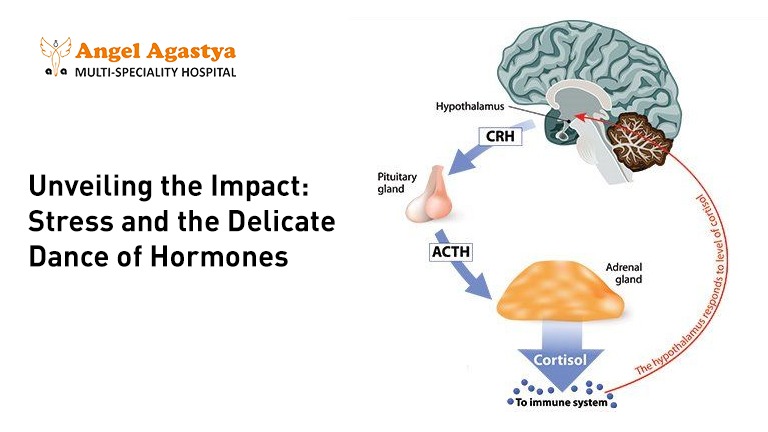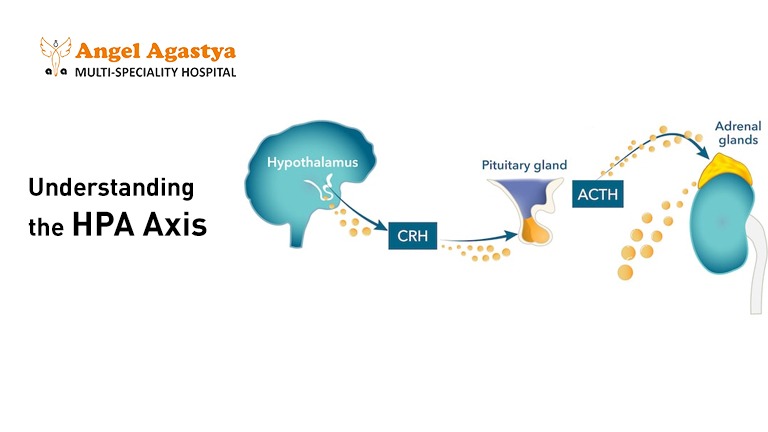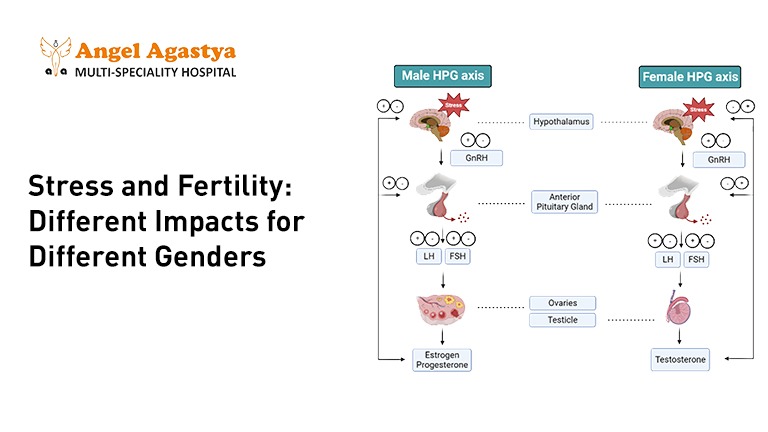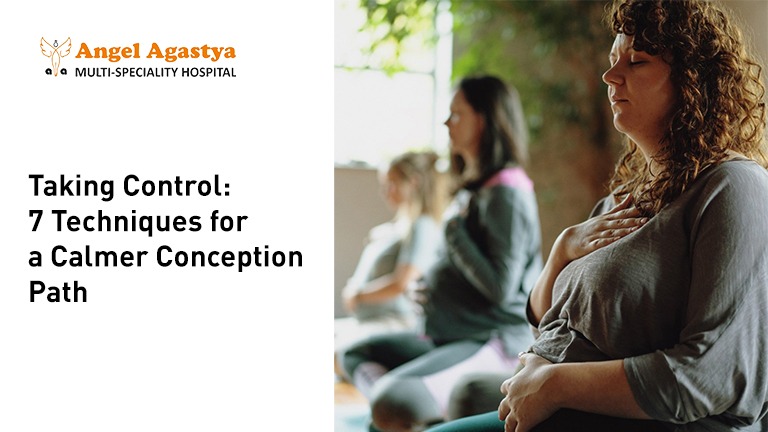Wondering, how to manage Stress and Fertility?
Imagine this: Months of trying, negative pregnancy tests, and a growing sense of disappointment. Trying to conceive can be an emotional rollercoaster, and the pressure to get pregnant can add another layer of stress. You might wonder, “Is stress silently sabotaging your baby dreams?”
The answer is complex. While stress doesn’t directly block conception, it can play a role in your overall reproductive health. This blog post dives into the science behind stress and fertility, offering hope and practical strategies to create a more fertile environment for you and your partner.
Feeling stressed while trying to conceive is completely normal. Millions of couples face this challenge of managing stress and fertility. The good news is, stress doesn’t have to be a fertility roadblock. By understanding the connection between stress and your body, you can take proactive steps to manage it. This blog empowers you with knowledge and practical strategies to navigate this journey with less anxiety and more hope.
Unveiling the Impact: Stress and (Fertility) the Delicate Dance of Hormones
Let’s delve into the science. When you’re stressed, your body releases a hormone called cortisol. This is a natural response, designed to help you cope with a perceived threat. However, chronic stress can lead to elevated cortisol levels, disrupting the delicate hormonal balance crucial for fertility.

In women, high cortisol can interfere with ovulation, the process of releasing an egg from the ovary. It can also affect the lining of the uterus, making it less hospitable for implantation. For men, stress can impact sperm quality, reducing sperm count and motility.
Understanding the HPA Axis: This complex system involving the hypothalamus, pituitary gland, and adrenal glands plays a central role in stress response and hormone regulation. Chronic stress disrupts this axis, leading to hormonal imbalances that can affect fertility.

Stress and Fertility: Different Impacts for Different Genders
Stress can manifest differently in men and women, impacting fertility in specific ways:

- Women: As mentioned earlier, stress can disrupt ovulation and affect the uterine lining. It can also lead to irregular periods, making it harder to track ovulation cycles.
- Men: Chronic stress can decrease sperm count and motility, hindering their ability to reach and fertilize the egg.
Taking Control: 7 Techniques for a Calmer Conception Path
Now that we understand the science practically! Here are 7 actionable techniques you and your partner can incorporate into your daily routine to manage stress and create a more fertile environment:

- 1. Mindfulness Meditation: This practice helps cultivate focus and awareness of the present moment, reducing stress and promoting relaxation. There are numerous guided meditations available online or through apps.
- 2. Deep Breathing Exercises: Taking slow, deep breaths activates the relaxation response in your body, counteracting the fight-or-flight response triggered by stress.
- 3. Yoga: Combining physical postures, breathing exercises, and meditation, yoga offers a holistic approach to stress management and overall well-being.
- 4. Prioritize Sleep: Aim for 7-8 hours of quality sleep each night. Your body is better equipped to manage stress and support optimal hormonal function when well-rested.
- 5. Nourish Your Body: Eating a balanced diet rich in fruits, vegetables, and whole grains provides your body with the nutrients it needs to manage stress and support reproductive health.
- 6. Connect with Nature: Spending time outdoors in nature has been shown to reduce stress levels and improve mood. Walking in the park, doing hiking, or simply sit outside in the nature and breathe the fresh air.
- 7. Build a Support System: Surround yourself with loved ones who offer emotional support and understanding during this journey. Talking to a therapist or counselor can also be beneficial for managing anxiety and stress and fertility improvement.
Finding Your Relaxation Style: Not all stress management techniques work for everyone. Try different approaches and find out what you and your partner find rejuvenating. Consistency is key, so try to incorporate these practices into your daily routine for optimal results.
The Power of Self-Care:
Don’t underestimate the importance of prioritizing activities that bring you joy and support your emotional well-being. Whether it’s reading a good book, taking a relaxing bath, or spending time on a cherished hobby, make time for self-care.
Seeking Professional Help: If you’re struggling to manage stress on your own, consider seeking professional help. A therapist or counselor can equip you with tools and techniques to address stress and improve your overall well-being.
Remember, managing stress is a journey, not a destination. By incorporating these actionable tips into your daily routine, you and your partner can create a calmer and more supportive space for achieving your dream of parenthood. Don’t let stress steal your fertility journey – take control, embrace these techniques, and move forward with hope and resilience.
Don’t Let Stress Steal Your Fertility Journey: A Hopeful Guide (Summary)
Trying to conceive can be an emotional rollercoaster, and stress can add another layer of worry. This blog post explores the connection between stress and fertility, offering hope and practical strategies.
We delve into the science, explaining how chronic stress can disrupt hormone production and potentially impact ovulation, sperm quality, and overall reproductive health.
The good news is, stress doesn’t have to be a roadblock. By understanding the impact of stress, you and your partner can take control.
This guide equips you with 7 actionable techniques to manage stress and fertility improvement, including mindfulness meditation, deep breathing, yoga, prioritizing sleep, and a balanced diet.
We also explore the importance of self-care, building a support system, and seeking professional help if needed regarding management of Stress and Fertility.
By incorporating these tips and fostering a calmer environment, you can move forward with hope and resilience on your path to parenthood while managing stress and fertility separately.
FAQs:
- How much stress is too much when trying to conceive?
There’s no one-size-fits-all answer regarding Stress and Fertility. However, chronic stress, characterized by prolonged periods of elevated cortisol levels, can potentially impact fertility. If you find daily activities significantly challenging due to stress, or it’s affecting your sleep or relationships, consider seeking professional support to develop healthy coping mechanisms.
- Can stress affect the success rate of fertility treatments?
Studies suggest a possible link between stress and fertility reduced success rates with some treatments like IVF. However, the research isn’t conclusive. Managing stress can benefit your overall health and well-being, regardless of whether you’re pursuing natural conception or fertility treatments.
- Are there specific relaxation techniques proven to manage stress and fertility improvement?
While there isn’t a single technique guaranteed to boost fertility, research suggests that stress management practices like mindfulness meditation, yoga, and deep breathing exercises can be helpful. These techniques promote relaxation and potentially improve hormonal balance, creating a more favorable environment for conception.
- Does stress lower sperm count?
Chronic stress can negatively impact sperm production. Studies have shown a correlation between elevated cortisol levels and decreased sperm count and motility. Managing stress can potentially improve sperm health, although consulting a doctor for a semen analysis might be helpful for a more personalized assessment.
- Can stress cause irregular periods?
Yes, stress can disrupt the hormonal regulation involved in your menstrual cycle, leading to irregular periods. This can make it challenging to track ovulation and plan for conception. Techniques to manage stress can help regulate your cycle and improve predictability.
- How long does it take for stress levels to affect fertility?
The exact timeframe is unclear, but chronic stress is likely the key concern. If you’re experiencing ongoing stress for weeks or months, it might be impacting your fertility.
- Are there any medications that can help manage stress while trying to conceive?
While some medications can be prescribed for anxiety or sleep disorders, these should be discussed with a doctor and may not be suitable for everyone, especially when trying to conceive. Natural stress management techniques are often a preferred approach.
- What are some signs that stress might be impacting your fertility?
Common signs include irregular periods, difficulty sleeping, changes in appetite, and difficulty concentrating. If you’re experiencing these symptoms persistently, consider talking to your doctor to rule out any underlying medical conditions and discuss strategies for managing stress and fertility improvement.
- Can talking to a therapist improve your chances of getting pregnant?
Therapy can equip you with tools and techniques to manage anxiety and stress and fertility improvement, which can potentially improve your overall well-being and potentially create a more favorable environment for conception.
- What are some additional resources for couples struggling with stress and fertility?
Here are some helpful resources:
- The American Society for Reproductive Medicine (ASRM): [https://www.asrm.org/](https://www.asrm.org/)
- The National Institute of Child Health and Human Development (NICHD): [https://www.nichd.nih.gov/](https://www.nichd.nih.gov/) Resolve: The National Infertility Association: [https://resolve.org/](https://resolve.org/)

